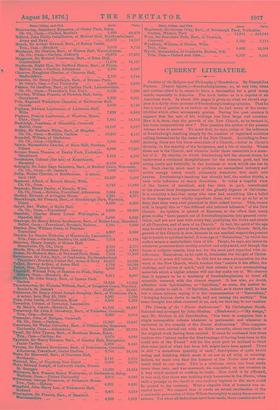CFRRENT LITERATURE.
Outlines of the Religion and Philosophy of Swedenborg. By Theophilus Parsons. (James Speirs.)-Swedenborgianism, or, at any rats, ideas and notions allied to it, seems to have a fascination for a good many minds, especially in America. The book before us is a reprint of an American work. In about 300 pages it gives us what we should sup- pose is a fairly clear account of Swedenborg's leading opinions. That he was a man of genius is as certain as that he had many of the eccen- tricities which often accompany genius. During the past century it appears that the sale of his writings has been large and constant. How is it, then, that the growth of the New Church, as he termed it, has been comparatively slow ? This question the author of the present volume tries to answer. We must first, he says, judge of the influence of Swedenborg's teaching simply by the number of organised societies calling themselves by the name of the New Church. According to Swe- denborg, there are but three essentials of a Church,-beliof in Christ's divinity, in the sanctity of the Scriptures, and a life of charity. Where these are is the Church, and whoever holds these essentials is a mem- ber of it. By charity, on which Swedenborg laid the utmost stress, he understood a continual thoughtfulness for the common good, and the acting justly and faithfully in the business or work which one has to do. Such charity must tend to produce an unremittod industry and active energy which would ultimately transform this earth into heaven. Swedenborg's teaching has already had, the author thinks, a very wide influence in many directions. It takes a hopeful view of the future of mankind, and has thus, in part, contributed to the almost total disappearance of the ghastly dogmas of Calvinism. Ibis certainly a fact that many who once had something like a belief in these dogmas now wholly repudiate them, and even go so far as to deny that they were ever preached in their naked horror. This, we are told, is largely duo to "the diffused and indirect influence" of the New Church. An opinion is quoted of Emerson, to the effect that many great truths "have passed out of Swodenborgianism into general circu- lation, and are now met with every day, qualifying the views and creeds of all Churches, and of men of no Church." In fact, the spirit of the age may be said to be, in part at least, the spirit of the New Church. Still, the growth of the Church is slow, because in one marked respect the present age is hostile to spiritual belief. It is an age of "Naturalism," by which the author means a materialistic view of life. People, he says, are intent on whatever promotes their earthly comfort and enjoyment, and though the forms of religion remain, they are for the most part regarded with in- difference. Naturalism, as he calls it, dominates the thought of Christ- endom as it never did before. In this fact he sees s. preparation for the work of the New Church, which teaches that "nature is the effect, the clothing, and mirror of spirit," and that science is now accumulating materials which a higher science will one day make use of. We observe that it appears to be a tendency of Swedenborgianism to treat all scientific research with the utmost respect. It has also, no doubt, affinities with Spiritualism, or "Spiritism," as some, the author in- cluded, prefer to call it. Of Spiritism, indeed, as it shows itself, he has but a mean opinion, saying it is the consummation of "Naturalism," "bringing heaven down to earth, and not raising the earthly." The same thought has often occurred to us, and, we dare say, to our readers.


































 Previous page
Previous page